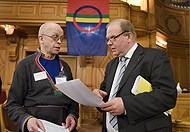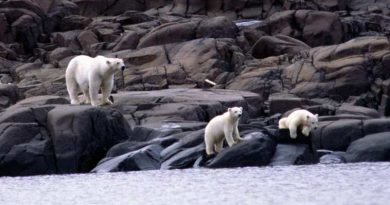Swedish Arctic Perspectives: Part II
Read Part I of Swedish Arctic Perspectives
 President of the Sami parliament, Stefan Mikaelsson (left) with Swedish agriculture minister, Eskil Erlandsson, at the Swedish parliament
President of the Sami parliament, Stefan Mikaelsson (left) with Swedish agriculture minister, Eskil Erlandsson, at the Swedish parliament
This second part of a two part report on the geopolitics of the Arctic in Sweden looks at how the indigenous Sami people view the challenge of global warming and what environmentalists say about Swedish involvement in oil and gas exploration.
The livelihoods of Sweden’s indigenous Sami people are at risk from global warming.
Reindeer herding, still an important part of the Sami way of life, has already been affected by changes in the seasons, says Stefan Mikaelsson, president of the Sami Parliament.
“The tree line is getting higher and it’s very obvious that parasites are moving further and further north. The strong Arctic cold kept parasites and diseases away for centuries but now we’re facing the tragic possibility of them destroying our reindeer meat,” he told Radio Sweden.
Conflicts of Interest
A report on the likely effects of climate change, commissioned by the Swedish environment ministry in 2007 predicted that there will be many positive effects on the country – one of them being warmer, wetter weather in the summer which will boost forestry and agriculture.
It also forecasted harder conditions for the reindeer industry, with harsher winters cutting off traditional grazing areas, creating a need for new land access rights. The report warned that this can “lead to increased conflicts of interest with other industries.”
This is something that worries Mikaelsson, who says that when it comes to a trade off between industrial projects and Sami rights, the Sami lose out.
A giant wind farm – the biggest in Europe with more than a thousand windmills – is planned for the northern Swedish town of Piteå which is near reindeer grazing lands and Sami protests were overruled by the regional government.
Infrastructure Vs Land and Water Rights
The Sami’s say this is just one example of the government riding roughshod over their constitutional right to access lands and water.
“We’re not satisfied about how our views are treated by the government. We should have the same possibilities as the representatives of the Swedish people,” said Mikaelsson
Sweden’s Arctic Ambassador, Helena Ödmark at Sweden’s foreign ministry, agrees that more needs to be done to balance the interests of the Samis with economic development.
“We do have a history of other issues taking precedent – particularly large scale infrastructure development,” she said.
“But it’s not only the Sami people that get hurt in those cases – very often also other local communities with small scale forestry, agriculture and fisheries interests – they are also sometimes not heard.”
Oil Exploration
While the Swedish Arctic is solid land, most of the Arctic is a sea, and there is also a growing struggle there between economic interests and groups that say the regions fragile environment needs to be protected.
Dr Therese Jacobson, a microbiologist at Greenpeace Nordic, says that countries like Sweden, which speak out about environmental protection internationally, need to step up and do more to ensure that a similar disaster does not happen in the Arctic.
A Swedish state-owned icebreaker is currently working for a US prospecting company off the north coast of Greenland, and Greenpeace accuses Sweden of hypocrisy as the same ship brought the Swedish King on a much publicised study tour of the Arctic environment just a few years ago.
“Sweden has said we want to protect the Arctic but this is a step in the opposite direction, facilitating oil exploration in this area,” she said.
“If you have an oil spill in the Arctic, it takes a much, much longer time to break down and you don’t have anything like the kind of infrastructure you have in the Mexican Gulf. An oil spill up here would be almost impossible to clean up.”



